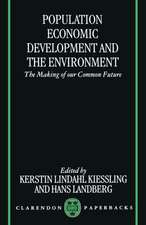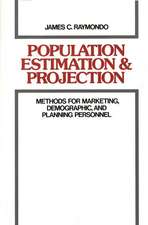Fertility and Social Interaction: An Economic Perspective
Autor Hans-Peter Kohleren Limba Engleză Hardback – 27 sep 2001
Preț: 683.68 lei
Preț vechi: 1038.50 lei
-34% Nou
Puncte Express: 1026
Preț estimativ în valută:
130.84€ • 136.09$ • 108.01£
130.84€ • 136.09$ • 108.01£
Carte tipărită la comandă
Livrare economică 04-10 aprilie
Preluare comenzi: 021 569.72.76
Specificații
ISBN-13: 9780199244591
ISBN-10: 0199244596
Pagini: 230
Ilustrații: numerous figures and tables
Dimensiuni: 146 x 225 x 17 mm
Greutate: 0.39 kg
Ediția:New.
Editura: OUP OXFORD
Colecția OUP Oxford
Locul publicării:Oxford, United Kingdom
ISBN-10: 0199244596
Pagini: 230
Ilustrații: numerous figures and tables
Dimensiuni: 146 x 225 x 17 mm
Greutate: 0.39 kg
Ediția:New.
Editura: OUP OXFORD
Colecția OUP Oxford
Locul publicării:Oxford, United Kingdom
Notă biografică
Hans-Peter Kohler received his M.A. in Demography (1994) and Ph.D. in Economics (1997) from the University of California at Berkeley. He is currently head of the research group on Social Dynamics and Fertility at the Max Planck Institute for Demographic Research in Rostock and part-time professor at the University of Southern Denmark in Odense. His primary research interest is processes of social interactions and their relevance for fertility and AIDS-related behaviors in developing and developed countries. Hans-Peter Kohler is also engaged in research on lowest-low fertility levels, the biodemography of fertility, and demographic methods. Recent publications have appeared in Demography, Journal of Development Economics, Journal of Population Economics, Population Studies, Demographic Research, Behavior Genetics, and Population and Development Review.








